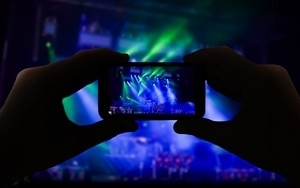 About as quickly as the smartphone became ubiquitous in American life so did the self-mockery of our obsessive absorption into these screens. Street walkers with heads down
walking into oncoming traffic became a common trope. Parents scolding children texting at dinner became a ritual (especially when eating with the grandparents). In culture, as in physics, for every
action there is some sort of opposite reaction, even if it may not be as equal and countervailing as in the physical world. We tend to register our own excesses in some way or another, if for no other
reason than a general grumpiness over change. We like to complain about the ubiquity, annoying rituals of phone obsession, usually between among our own 50 or 60 phone look-ups a day.
About as quickly as the smartphone became ubiquitous in American life so did the self-mockery of our obsessive absorption into these screens. Street walkers with heads down
walking into oncoming traffic became a common trope. Parents scolding children texting at dinner became a ritual (especially when eating with the grandparents). In culture, as in physics, for every
action there is some sort of opposite reaction, even if it may not be as equal and countervailing as in the physical world. We tend to register our own excesses in some way or another, if for no other
reason than a general grumpiness over change. We like to complain about the ubiquity, annoying rituals of phone obsession, usually between among our own 50 or 60 phone look-ups a day.
The
resistance to the always-on press of technology is evident in a number of little but important ways. Away messages in email and voice mail have become more prevalent and strident. Many people announce
their unpluggedness via auto responses over the weekends or during vacation, where they declare proudly they will not be answering emails. And I usually get a reply from most of them in minutes
anyway.
advertisement
advertisement
In addition to the dinner table and conversational rudeness that smartphones provoke, we also see them transforming a range of public events. Entire crowds of people have now grown a
foot taller by virtue of phones being held up to record live events. Just about every concertgoer has experienced it, if not been part of the problem himself. Seeing the stage around and through a set
of smartphone screens has become a regrettable part of the experience. The upside is that you can now find snippets of just about any recent concert performance on YouTube. The downside is that most
live performances have become visual obstacle courses for the audience and even weirder experiences for some performers, who argue that their audiences no longer seem to be in the moment.
In
an effort to get audiences to live in the moment, the new startup Yondr is offering venues smartphone lockboxes that prevent phone use while in the venue and create so-called no-phone zones. The
attendee doesn’t hand over her phone at the venue door but must have her phone slipped into a locking sleeve that is then unlocked at the exit.
One would think that rights holders would
be among the most enamored of the technology. But an Ars Technica reporter
who tried the technology at a Yondr launch party says that most early clients are more interested in restoring the live experience. Yondr CEO Graham Dugoni told Ars Technica: “The copyright
issue is certainly useful to some, but we have seen a lot more interest on the experiential side. A lot of artists simply want to have phone-free shows because they believe it makes for a better
experience. Artists experience the issue most acutely, so it's not surprising they have been receptive to the idea."
Whether Yondr becomes a real fixture at public events is
questionable. Personally, I think smartphones have become tools and even icons of personal empowerment. We will not put them away easily or willingly at this point. What is interesting to me is how
Yondr does tease out a growing tension between smartphones and social etiquette. For many of us mediated reality has become the reality. Or at least, making a personal record of an experience is of
such importance to us that we let it impede the experience itself. This is not entirely new, of course. How many families have that uncle with the camera or vidcam insisting that every moment of
family gatherings and holidays be posed and kept as a photo memory? Apple’s famous holiday ad last year was a brilliant play on the phone-absorbed teen -- who makes a tearjerker film about the
family from which we presume he is alienated.
The tension between smartphones and moments, smartphones and social responsibility, smartphones and places will not be resolved so much as
incorporated into the American conversation. This new personal power to mediate moments, situations, events, places in more socially intrusive ways shows just how much the phone itself has become a
site for a tension that is as old as American culture -- the relentless tension between self-expression and social order and obligation.
"Man filming a concert with a mobile phone" photo from Shutterstock.